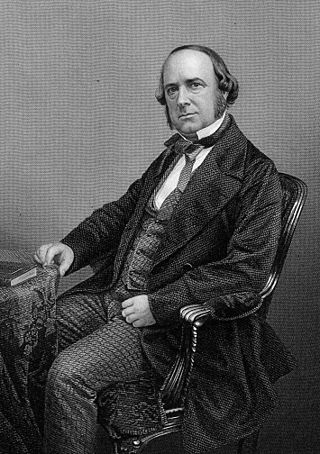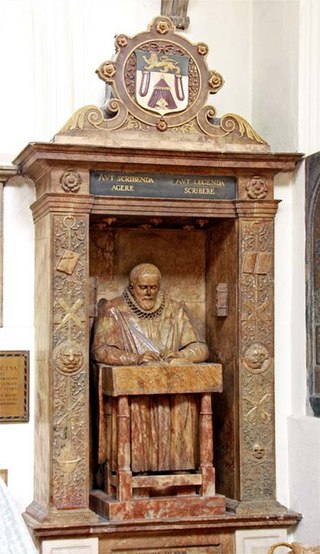Related Research Articles

Sir Thomas de Ercildoun, better remembered as Thomas the Rhymer, also known as Thomas Learmont or True Thomas, was a Scottish laird and reputed prophet from Earlston in the Borders. Thomas' gift of prophecy is linked to his poetic ability.

William Camden was an English antiquarian, historian, topographer, and herald, best known as author of Britannia, the first chorographical survey of the islands of Great Britain and Ireland, and the Annales, the first detailed historical account of the reign of Elizabeth I of England.
James Gairdner was a British historian. He specialised in 15th-century and early Tudor history, and among other tasks edited the Letters and Papers of the Reign of Henry VIII series.

Thomas Wright was an English antiquarian and writer. He is chiefly remembered as an editor of medieval texts.

Sir John Cheke (or Cheek) (16 June 1514 – 13 September 1557) was an English classical scholar and statesman. One of the foremost teachers of his age, and the first Regius Professor of Greek at the University of Cambridge, he played a great part in the revival of Greek learning in England. He was tutor to Prince Edward, the future King Edward VI, and also sometimes to Princess Elizabeth. Of strongly Reformist sympathy in religious affairs, his public career as provost of King's College, Cambridge, Member of Parliament and briefly as Secretary of State during King Edward's reign was brought to a close by the accession of Queen Mary in 1553. He went into voluntary exile abroad, at first under royal licence (which he overstayed). He was captured and imprisoned in 1556, and recanted his faith to avoid death by burning. He died not long afterward, reportedly regretting his decision.

John Stow was an English historian and antiquarian. He wrote a series of chronicles of English history, published from 1565 onwards under such titles as The Summarie of Englyshe Chronicles, The Chronicles of England, and The Annales of England; and also A Survey of London. A. L. Rowse has described him as "one of the best historians of that age; indefatigable in the trouble he took, thorough and conscientious, accurate – above all things devoted to truth".
Adam of Saint Victor was a prolific poet and composer of Latin hymns and sequences. He has been called "...the most illustrious exponent of the revival of liturgical poetry which the twelfth century affords."
Polydore Vergil or Virgil, widely known as Polydore Vergil of Urbino, was an Italian humanist scholar, historian, priest and diplomat, who spent much of his life in England. He is particularly remembered for his works the Proverbiorum libellus (1498), a collection of Latin proverbs; De inventoribus rerum (1499), a history of discoveries and origins; and the Anglica Historia, an influential history of England. He has been dubbed the "Father of English History".
Ælfric of Eynsham was an English abbot and a student of Æthelwold of Winchester, and a consummate, prolific writer in Old English of hagiography, homilies, biblical commentaries, and other genres. He is also known variously as Ælfric the Grammarian, Ælfric of Cerne, and Ælfric the Homilist. In the view of Peter Hunter Blair, he was "a man comparable both in the quantity of his writings and in the quality of his mind even with Bede himself." According to Claudio Leonardi, he "represented the highest pinnacle of Benedictine reform and Anglo-Saxon literature".
Charles Julius Bertram (1723–1765) was an English expatriate in Denmark who "discovered"—and presumably wrote—The Description of Britain, an 18th-century literary forgery purporting to be a mediaeval work on history that remained undetected for over a century. In that time, it was highly influential for the reconstruction of the history of Roman Britain and contemporary Scotland, to the extent of appearing in Gibbon's Decline and Fall of the Roman Empire and being used to direct William Roy's initial Ordnance Survey maps. Bertram "discovered" the manuscript around the age of 24 and spent the rest of his life a successful academic and author. Scholars contested various aspects of the Description, but it was not recognized as an unquestionable forgery until 1846.
Thomas Rymer was an English poet, critic, antiquary and historian. His lasting contribution was to compile and publish 16 volumes of the first edition of Foedera, a work in 20 volumes conveying agreements between The Crown of England and foreign powers since 1101. He held the office of English Historiographer Royal from 1692 to 1714. He is credited with coining the phrase "poetic justice" in The Tragedies of the Last Age Consider'd (1678).

Philemon Holland was an English schoolmaster, physician and translator. He is known for the first English translations of several works by Livy, Pliny the Elder, and Plutarch, and also for translating William Camden's Britannia into English.
Byrhtferth was a priest and monk who lived at Ramsey Abbey in Huntingdonshire in England. He had a deep impact on the intellectual life of later Anglo-Saxon England and wrote many computistic, hagiographic, and historical works. He was a leading man of science and best known as the author of many different works. His Manual (Enchiridion), a scientific textbook, is Byrhtferth's best known work.
Henry Benjamin Wheatley FSA was a British author, editor, and indexer. His London Past and Present was described as his most important work and "the standard dictionary of London."
The Description of Britain, also known by its Latin name De Situ Britanniae, was a literary forgery perpetrated by Charles Bertram on the historians of England. It purported to be a 15th-century manuscript by the English monk Richard of Westminster, including information from a lost contemporary account of Britain by a Roman general, new details of the Roman roads in Britain in the style of the Antonine Itinerary, and "an antient map" as detailed as the works of Ptolemy. Bertram disclosed the existence of the work through his correspondence with the antiquarian William Stukeley by 1748, provided him "a copy" which was made available in London by 1749, and published it in Latin in 1757. By this point, his Richard had become conflated with the historical Richard of Cirencester. The text was treated as a legitimate and major source of information on Roman Britain from the 1750s through the 19th century, when it was progressively debunked by John Hodgson, Karl Wex, B. B. Woodward, and J. E. B. Mayor. Effects from the forgery can still be found in works on British history and it is generally credited with having named the Pennine Mountains.
The Catholicon Anglicum is an English-to-Latin bilingual dictionary compiled in the late 15th century.

"Hark, Hark! The Dogs Do Bark" is an English nursery rhyme. Its origins are uncertain and researchers have attributed it to various dates ranging from the late 11th century to the early 18th century. The earliest known printings of the rhyme are from the late 18th century, but a related rhyme was written down a century earlier than that.
References
- ↑ Starnes, DeWitt T. (1954). Renaissance Dictionaries: English-Latin and Latin-English. Austin: University of Texas Press. pp. 353–355.
- ↑ Stein, Gabriele (1985). The English Dictionary before Cawdrey. Walter de Gruyter. pp. 226–244. ISBN 9783111664873.
- ↑ Henry Benjamin Wheatley's "Preface" to Levens (1867). Manipulus vocabulorum. Camden Society. pp. i–xv.
- ↑ Levens, Peter (1570). Manipulus Vocabulorum: A Rhyming Dictionary of the English Language. London: John Waley.
- ↑ Levens, Peter (1867). Wheatley, Henry Benjamin (ed.). Manipulus vocabulorum. Westminster: The Camden Society.
- ↑ Levens, Peter (1867). Wheatley, Henry Benjamin (ed.). Manipulus vocabulorum. London: Trübner and Co. for the Early English Text Society.
- ↑ Levens (1867). Manipulus vocabulorum. Camden Society. See note immediately preceding "Preface".